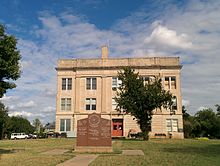Cotton County, Oklahoma
| Cotton County, Oklahoma | |
|---|---|

Cotton County Courthouse in September 2014
|
|
 Location in the U.S. state of Oklahoma |
|
 Oklahoma's location in the U.S. |
|
| Founded | 1912 |
| Seat | Walters |
| Largest city | Walters |
| Area | |
| • Total | 642 sq mi (1,663 km2) |
| • Land | 633 sq mi (1,639 km2) |
| • Water | 9.3 sq mi (24 km2), 1.4% |
| Population (est.) | |
| • (2012) | 6,155 |
| • Density | 9.8/sq mi (4/km²) |
| Congressional district | 4th |
| Time zone | Central: UTC-6/-5 |
Cotton County is a county located in the U.S. state of Oklahoma. As of the 2010 census, the population was 6,193. Its county seat is Walters. When Oklahoma achieved statehood in 1907, the area which is now Cotton County fell within the boundaries of Comanche County. It was split off in 1912, becoming the last county created in Oklahoma; it was named for the county's primary crop.
Cotton County is included in the Lawton, OK Metropolitan Statistical Area.
The eastern part of what is now Cotton County was opened to settlement by non-Native Americans by the 1901 Kiowa-Comanche-Apache Opening, which distributed land by a lottery system. In 1906, the remainder of the present county, then known as the Big Pasture was opened through a sealed bid process. Most of this territory became part of Comanche County at statehood in 1907.
In 1910, residents of the present Cotton County area tried to form a new county, named "Swanson County," but this effort failed in 1911. Another effort in 1912 succeeded. This time, residents elected to split from Comanche County and name the new county "Cotton County," for the primary crop in the region at the time.Randlett, Oklahoma was assigned as a temporary county seat, until a November 4, 1912 election made Walters, Oklahoma the permanent location.
Wheat became more prevalent than and corn just as prevalent as cotton as early as 1915. In 1934, corn had dwindled and winter wheat, cotton and oats had become the primary crops.
The county population has generally declined since 1920. In 1920, the population was 16,679. In 1930, it was 15,542. There was a brief increase in the late 1900s, but decline resumed in the 21st century.
...
Wikipedia
